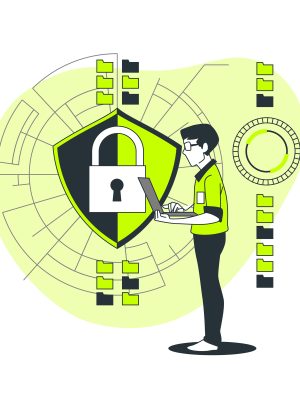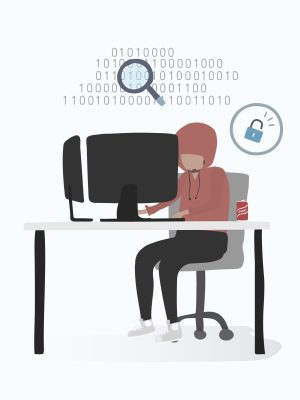Fortifying the Digital Frontier
Protecting your world from cyber threats.
Cybersecurity

Cybersecurity defines as protecting data, systems and networks within digital realm from invasion, abuse or harm by any means necessary. Risk management, vulnerability assessments, threat detections and incident responses form part of an endless cycle which addresses any legal, ethical or societal implications while assuring confidentiality, integrity and availability for critical infrastructure in digital world. Cybersecurity encompasses an ever-evolving ecosystem of technologies, methods, and practices designed to protect individuals against new cyber threats such as sophisticated malware used by criminals to cause disruption and harm against individuals, businesses and entire communities.

CyberSecurity and its role in todays' society?

Security from Online Dangers and Attacks
Cybersecurity is integral in providing users, businesses, and governments with protection from online dangers such as malware, viruses, ransomware, phishing attacks and hacking that threaten confidentiality, disrupt business operations and cost money and damage reputations. A strong CyberSecurity solution will protect digital assets from being exposed or lost forever.Cybersecurity is a constantly evolving field that encompasses the protection of digital systems, networks, and data from potential cyber threats. With the rise of technology and the increasing digitization of businesses, it has become essential for companies to ensure the security of their sensitive information.
Security for Essential Facilities
Cyberattacks on essential infrastructures such as electricity grid, transportation networks and communication systems could create widespread disruption and anarchy – therefore cybersecurity must be implemented to keep these vital services running efficiently while guarding against potential dangers to public safety.
Strengthening of National Defense
A robust CyberSecurity defense has become increasingly crucial to maintaining national security as technological connectivity between nations increases. Cyber espionage, cyber sabotage and other forms of cyber warfare against government institutions, military systems or key infrastructure could cause irreparable damage; to counter such threats it’s imperative for nations to implement appropriate CyberSecurity measures that ensure their own national defense is safeguarded by strong CyberSecurity measures.
Building Trust in Technological Advancement
If people lack faith in new technologies, their impact could stall economic activity and hamper creativity. Cybersecurity’s role in maintaining faith in digital infrastructure and data reliability plays a pivotal role here; people and businesses become more willing to adopt and enhance them over time.
Security from Online Dangers and Attacks
Cybersecurity is integral in providing users, businesses, and governments with protection from online dangers such as malware, viruses, ransomware, phishing attacks and hacking that threaten confidentiality, disrupt business operations and cost money and damage reputations. A strong CyberSecurity solution will protect digital assets from being exposed or lost forever.
Security for Essential Facilities
Cyberattacks on essential infrastructures such as electricity grid, transportation networks and communication systems could create widespread disruption and anarchy – therefore cybersecurity must be implemented to keep these vital services running efficiently while guarding against potential dangers to public safety.
Strengthening of National DefenseA robust CyberSecurity defense has become increasingly crucial to maintaining national security as technological connectivity between nations increases. Cyber espionage, cyber sabotage and other forms of cyber warfare against government institutions, military systems or key infrastructure could cause irreparable damage; to counter such threats it’s imperative for nations to implement appropriate CyberSecurity measures that ensure their own national defense is safeguarded by strong CyberSecurity measures.
Building Trust in Technological Advancement
If people lack faith in new technologies, their impact could stall economic activity and hamper creativity. Cybersecurity’s role in maintaining faith in digital infrastructure and data reliability plays a pivotal role here; people and businesses become more willing to adopt and enhance them over time.
Adherence to Rules and Laws
Governments and regulatory agencies have put into effect laws and regulations designed to safeguard both individual data as well as enterprise commercial information. Cybersecurity regulations must be strictly observed if businesses wish to maintain customer trust as well as avoid legal repercussions; those failing to abide by such requirements risk legal ramifications as well as being sued and hit with fines that might jeopardise credibility issues with customers and stakeholders alike.
What types of cybersecurity are available?
Best practices of cybersecurity
- Software and system upgrades must be conducted periodically in order to decrease the risks posed by exploitable security flaws
- Step two is to ensure your passwords are distinct and unique by creating lengthy and complex passwords – this might require using a password manager in order to easily remember them! For best results, utilize an electronic password manager if required.
- Utilize multi-factor authentication (MFA) as another layer of verification beyond simply password authentication for user identity proofing purposes. Preventing assaults involves regular training on security best practices as well as how to detect possible attack.
- Take Frequent Backups Maintaining copies of important data can lessen the impact of cyber attacks and attacks by making available copies that could help restore them should something go amis.
- Utilizing both firewalls and antivirus software is highly advised since both can detect and block attacks against both networks and computers.
- Reducing the risk of data breach by restricting access only to authorized users reduces their chance significantly.
- Utilize Encryption to Safeguard Sensitive Information.
- Encrypting makes it harder for hackers to read intercepted information and read your sensitive documents.
- Conduct Regular Security Audits Incorporating routine security audits can reveal any weaknesses and ensure all systems remain up to date.
Secure data and assets within the digital environment require continual innovation within cybersecurity. Due to our daily dependence on electronic devices, cyber security has never been so essential; taking measures and using tactics against hacking, malware, ransomware, phishing attacks etc are now more prevalent than ever before. Cyber attacks can have devastating repercussions for businesses of all sizes and sectors alike, both financially and brand equity wise. Cybersecurity must therefore remain top of mind among companies of all sizes across industries if their data are to remain safe; strong security measures, frequent software updates and employee training in best practices for combatting cyber assaults must all form part of this approach to keeping data protected. Cybersecurity industry needs to keep pace with cybercriminal's increasing sophistication, so only through combined efforts from government, private industry and concerned individuals will optimal security be reached. Therefore, both private companies and national governments need to do their part to strengthen cybersecurity by being both vigilant and pro-active in terms of digitalized society.
